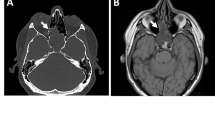Abstract
Background
Spindle cell tumours in the sinonasal area are diagnostically challenging. We identified a neoplasm that defied histopathological classification using current criteria.
Methods
The case was subjected to histopathological, immunohistochemical and molecular analysis using a large small variant DNA panel.
Results
The tumour comprised cytologically bland epithelioid spindle cells with a rich vasculature, which lack expression of actin and other smooth muscle markers, CD34 and beta-catenin. An activating insertion/deletion in exon 12 of the PDGFRA gene was detected. This alteration has previously been described in gastrointestinal stromal tumours and inflammatory fibroid polyps of the GI tract, but the site, histological, and immunophenotypic features in this tumour are distinct.
Conclusion
We describe a novel sinonasal spindle cell tumour characterised by an activating insertion/deletion in exon 12 of PDGFRA. The diagnosis of PDGFRA-activated sinonasal spindle cell tumour should be considered in difficult to classify mesenchymal lesions at this site.


Similar content being viewed by others
Data Availability
The genomic data for this case have been submitted to the Catalogue Of Somatic Mutations In Cancer (COSMIC) database (https://cancer.sanger.ac.uk/cosmic). The data have been assigned the signifier COSP51117 and will be made public following the variant being associated with a PubMed ID.
Code Availability
Analysis was performed using commercially available proprietary software TSO500 Local App v2.2 (Illumina).
References
Guérit E, Arts F, Dachy G et al (2021) PDGF receptor mutations in human diseases. Cell Mol Life Sci 78:3867–3881. https://doi.org/10.1007/s00018-020-03753-y
Heinrich MC, Corless CL, Duensing A et al (2003) PDGFRA activating mutations in gastrointestinal stromal tumors. Science 299:708–710
Huss S, Wardelmann E, Goltz D et al (2012) Activating PDGFRA mutations in inflammatory fibroid polyps occur in exons 12, 14 and 18 and are associated with tumour localization. Histopathology 61:59–68. https://doi.org/10.1111/j.1365-2559.2012.04203.x
Lasota J, Zeng-Feng Wang Z, Sobin L et al (2009) Gain-of-function PDGFRA mutations, earlier reported in gastrointestinal stromal tumors, are common in small intestinal inflammatory fibroid polyps. A study of 60 cases. Modern Pathol 22:1049–1056. https://doi.org/10.1038/modpathol.2009.62
Lasota J, Dansonka-Mieszkowska A, Sobin L et al (2004) A great majority of GISTs with PDGFRA mutations represent gastric tumors of low or no malignant potential. Lab Invest 84(7):874–883. https://doi.org/10.1038/labinvest.3700122
Funding
No funding was received to assist with the conducting of this study or the preparation of this manuscript.
Author information
Authors and Affiliations
Contributions
All authors contributed to the study conception and design. Collection of clinical data was performed by HH, FA and SM. Data acquisition and analysis were performed by JW, JT, JB and PT. The first draft of the manuscript was written by JW and all authors commented on previous versions of the manuscript. All authors read and approved the final manuscript.
Corresponding author
Ethics declarations
Conflict of interest
The authors have no relevant financial or non-financial interests to disclose.
Consent to Participate
Informed consent was obtained from all individual participants included in the study.
Consent for Publication
Consent for publication was obtained for every individual person’s data included in the study.
Ethical Approval
Local ethical approval was waived in view of the retrospective nature of the study and all the procedures performed being part of the routine care.
Research Involving Humans and/or Animals
This article does not contain any experimental studies with human or animal subjects.
Additional information
Publisher's Note
Springer Nature remains neutral with regard to jurisdictional claims in published maps and institutional affiliations.
Rights and permissions
Springer Nature or its licensor (e.g. a society or other partner) holds exclusive rights to this article under a publishing agreement with the author(s) or other rightsholder(s); author self-archiving of the accepted manuscript version of this article is solely governed by the terms of such publishing agreement and applicable law.
About this article
Cite this article
Watkins, J.A., Hatcher, H., Malhotra, S. et al. Identification of an Activating PDGFRA Deletion in a Novel Sinonasal Soft Tissue Neoplasm. Head and Neck Pathol 17, 576–580 (2023). https://doi.org/10.1007/s12105-023-01526-0
Received:
Accepted:
Published:
Issue Date:
DOI: https://doi.org/10.1007/s12105-023-01526-0




